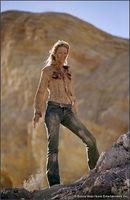I was surprised that DiCaprio actually showed up, considering he’s not much for public appearances. “I hate talk shows,” he told Harper’s Bazaar in 1995, “And you know what? I’m never going to do one again.” However, he’s since broken that promise, and with multiple award shows coming up, I think Miramax has pushed him to go out and schmooze up some votes—and given that this particular screening was centered around union actors (who will be voting in the much-coveted-by-actors SAG and BAFTA awards, for which DiCaprio and Alda are both nominees) and a few journalists, it must’ve seemed like a worthy opportunity to discuss his craft.
One would half-expect a mega-star like DiCaprio to shuffle in and out as quickly as possibly, but he showed up promptly at the end of the film, around 11 pm, and stuck around till nearly midnight, despite ear-splitting technical problems involving the shabby cordless microphones the actors were supposed to use. He was gracious and generally intelligent and provided a lot of insight into the making of the movie. I almost feel bad for referring to him as DiCRAPio for most of my life. But, my god, he so often seems like such a whiny, scene chewing, overrated thespian. I mean, have you scene “The Beach”? What dreck! And I won’t even get into his preening in “Titanic”. . .
But that makes me think: The reason journos so often write lovingly about celebrities in magazine profiles isn’t because they’re star-struck (journalists are a jaded lot) or because they’ve been paid off by the studios (well, crap mags like Movieline’s Hollywood Life are willing to occasionally kiss ass in exchange for favors, but I’m talking about higher-brow publications). No, it’s because when you speak to a star in real life, you’re instantly struck by just how damn real they are. Heck, sometimes they’re even literate. There are plenty of prima donnas out there, but when a guy like DiCrapio (oops, I did it again) turns out to be a nice fella, it’s hard to take jabs at his pretty face.

DiCaprio with snazzy facial hair,
care of the art department.
That being said, Alda is much better in front of a crowd. When the mikes went out, his theatre training kicked in and his voice expanded clearly to the back of the movie house. Whenever the moderator ran out of questions, Alda picked up the slack by interviewing DiCaprio himself. And whenever DiCaprio’s sentences puttered off, Alda filled in the gaps with one amusing anecdote after the next. He was unstoppably funny and gregarious.
I didn’t have my trusty tape recorder on me, so I paraphrase the following:
DiCaprio: “On ‘Gangs of New York’ there was a scene where Cameron Diaz was supposed to slap me, right before we make love against a wall. So Marty [Scorsese] pulled me aside and said ‘Listen, if Bob [Robert De Niro] were doing a scene like this, he’d do it for real. So I said, ‘Stop right there. If Bob would do it, of course I’ll do it.’ So we do the take and Cameron slaps me. With an open hand. Pretty hard. And the take is good, you know? But Marty says we need another. So we do it again. And again. And I ended up getting slapped for 47 takes, until my face was swelling up. But Marty’s like that. He’s a perfectionist. But he doesn’t overdo it, like some directors, he just gets what he needs. But it’s not easy getting slapped that hard 47 times in a row, and it’s not always pleasant having to do these things for real, but when you can, you do it.”
Alda: “You must not have minded doing the second part of that scene for real.”
DiCaprio: “Huh?”
Alda: “After you got slapped, you made love to Cameron against the wall.”
DiCaprio: “Oh, well . . . “
Alda: “I mean, how did you do that 47 times in a row. That’s stamina!”
DiCaprio: “Well, um, we didn’t. . .”
Alda: “Scorsese really is a perfectionist. But this job certainly has its perks.”
DiCaprio and Alda later went on to boldly dispel a famous acting myth—the idea that actors can get so lost in character that they actually believe they are the character, and they’re truly in the scene, and not on a movie set. Again, I paraphrase:
DiCaprio: “People keep asking me if I had any trouble getting out of the character of Howard Hughes, but the truth is that it’s very difficult just to stay in character. When you’re on set, and 40 crewmembers are there, and giant klieg lights are shining down on you, and a grip is standing five feet away, staring at you and scratching his balls, and you have to say a particular line at a certain time as camera on a dolly rushes toward you, it’s not easy to pretend you’re somewhere else. So getting out of character is never the hard part.”
Alda: “It’s true, you know. Those moments when actors forget where they are, where they get lost in the scene, they’re very rare. You’re lucky if that happens for two seconds out of every week.”
DiCaprio: “And when it does happen, it’s usually a moment that’s not in the script—where the actors make a mistake or forget a line and begin to improvise. One of the things I like about working with Scorsese is that he cherishes those moments as much as the actors do, and he puts those takes on the screen, even if it wasn’t part of the screenplay.”
On the same cold NYC night, there was a special industry-screening of "Sideways" across the street, so the upcoming Oscar/BAFTA/SAG competition between the two films was palpable, with the future glory reapers metaphorically doing battle on opposing sides of 42nd Street.
The only DiCRAPio thing DiCaprio did the entire evening—the only nuance that really stuck in my craw—was his abuse of the word “literally.” He never got the word completely wrong, but he kept using it over and over again, mostly in ways that were not quite right. “These early aviators were literally like astronauts,” he repeated more than once. No, DiCrapio, they were “like astronauts” or they were “like early astronauts” or maybe they were “literally the predecessors of astronauts”—but combining literally (definition: in the sense of being without interpretation, embellishment, or exaggeration) with like (resembling or similar, sort of, in some way) is akin to mixing whiskey with tequila. You can do it, but it’s not very pleasant. Choose one liquor and stick to it for the night, bucko. At least he didn’t really screw up and say, “They were literally astronauts.” If he had, my urge to yell “DiCRAPio!” would have literally overwhelmed me.
To further digress: The word “virtually” at one time was a synonym for “literally,” but in popular parlance it now means “in essence or effect but not in fact.” So virtually could be a perfect word here— “Early aviators were virtually astronauts, since their work led directly to outer-space aeronautics.” But Leo had to kept handing out literally’s every chance he got, reminding me of a bang-up David Cross routine where Cross pronounces his loathing for people who says things like, “I laughed so hard I shat myself,” when, in fact, they didn’t shit themselves at all.
Back to the film: In a case of truth being stranger than fiction, the most unbelievable scenes in “The Aviator” are the one’s most steeped in fact. Hughes really did survive dangerous, explosive plane crashes (in fact, he survived three or four, and not just the two shown in this film). And the seemingly implausible sequences where Hughes impishly, potently, and uproariously stands up to a grievous congressional investigative panel—turning the tables on the committee’s chair, powerful Senator Ralph Owen Brewster—are based almost verbatim on genuine transcripts (Alda noted that in real life, Sen. Brewster was so trounced by Hughes that in the end Brewster had to step down and become a witness before his own investigation, defending himself against Hughes’ allegations of mischief). Instead, it’s the smaller details that are skimmed over to form a fluid narrative (e.g., Hughes’ wives are ignored by the film in favor his celebrity liaisons).
Regrettably, for a motion picture that runs like a non-stop homage to “Citizen Kane,” Scorsese never manages to find even a third of the depth, inventiveness, and empathy that “Kane” delivers. And yet it’s gorgeous to look at, and hard to immediately pinpoint the flaws.
Notably, the film fails to soar for at least an hour. It’s a noble effort—with splendid cinematography by Robert "Kill Bill" Richardson, sumptuous sets and costumes, good acting, and an exciting beginning and end—but, as with most biopics (including the recent “Ray”), the viewer’s emotional connection to the film is sustained only through the knowledge that this is a “real” story being watched. If it were revealed to be fiction, it would not be as watchable. Just as reality television is the device of a lazy TV industry, the biopic can fall into the same trap of laziness, shouting “Look, ma! It’s real, so it’s gotta be good! Forget the fact that this scene is ho-hum and pointless, it’s friggin’ real, dammit!”
Screenwriter John Logan is one of the hottest properties in Hollywood right now, with “Gladiator,” “The Last Samurai,” and “The Aviator” under his belt and big-name directors knocking on his door. And he’s certainly more literate than your average Tinsel Town hack. But come on—he can be so longwinded, lugubrious, and self-indulgent. Is this really the best money can buy? Then again, it may not be his fault—even Logan’s scripts go through multiple rewrites and have to be approved by numerous stars, creative personnel, brain-dead executives, etc. His first drafts might be brilliant. But somebody has to be blamed for the dithering, forgettable 60 minutes scattered throughout this 166-minute epic.
And, yeah, I would’ve preferred Billy Crudup in the role of Howard Hughes, but DiCaprio does a fine job. Especially after he gets past the DiCrapio whine in the first half hour and grows a mustache. (Film Fact: DiCaprio mentioned during the Q&A that the mustache is a fake, administered with glue. Ostensibly this was due to the movie's non-sequential shooting order, but from my firsthand glimpse of his eternally youthful, babyish face, I'd surmise the poor kid can’t grow proper facial hair—too bad, since he looked good with a beard. Normally the chap looks like a handsome, demonic 12 year old.)
His portrayal of Hughes' slipping into madness veers dangerously between brilliance and annoyance, but he pulls off a nice feat when he credibly shows Hughes regaining sanity for long enough to defeat the evil Senator—a tricky character bit. He doesn’t deserve the Oscar for “The Aviator,” but I’ll award him this: I’ll retire the tired DiCRAPio joke for a while. It literally wasn’t that good anyway.
***

A dirty Uma Thurman in "Kill Bill"
I finally saw “Kill Bill” (Volumes I & II) and I’m now in total agreement with Quentin Tarantino—Uma shoulda gotta Osca’ noma. I’d resisted watching the film in theatres because I wanted to see both parts back to back. And I resisted renting it because I wanted to wait for the rumored super-ultra director’s cut that’ll combine the two halves with new editing work and some gory action footage so far only seen in the Asian release. Also, I was worried I wouldn’t like the flick, ‘cause it looked cheesy. And cheesy it is, but in a brilliant way, with the campiness purposeful and handled with masterful aplomb, the action intense, the pathos palpable, and the character-depth ever expanding. “Kill Bill” is at the pinnacle of what every action-comedy should aspire to be.
***

Aussie Aussie Aussie! Oy oy oy!
Comedy From Down Under: I don't bloody care if you're American, British, Muslim, Vegetarian, Vegan, Obsessive Compulsive, or just plain ugly. You must commence with the eating of fresh lamb. Anything else would be un-Australian, mate.




